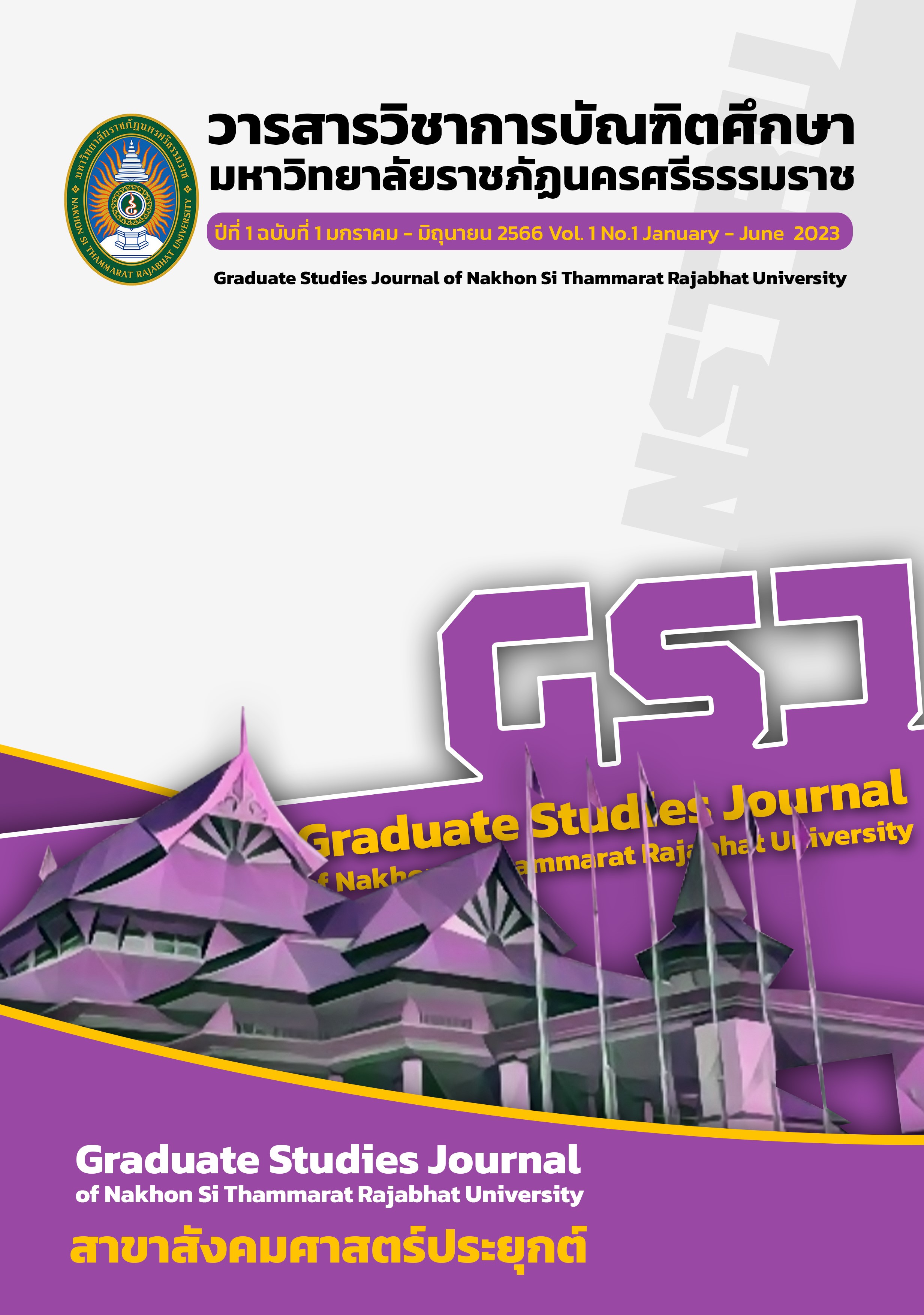การศึกษาการสื่อสารการตลาดออนไลน์สินค้าเกษตรอินทรีย์ของวิสาหกิจขนาดย่อมในเขตกรุงเทพมหานคร และปริมณฑล
คำสำคัญ:
การสื่อสารการตลาดออนไลน์, สินค้าเกษตรอินทรีย์, วิสาหกิจขนาดย่อมบทคัดย่อ
ปัจจุบันผู้บริโภคตระหนักถึงการดูแลสุขภาพมากขึ้น ส่งผลให้ตลาดสินค้าเกษตรอินทรีย์ขยายตัวอย่างต่อเนื่อง งานวิจัยนี้มีวัตถุประสงค์เพื่อศึกษาการสื่อสารการตลาดออนไลน์สินค้าเกษตรอินทรีย์ของวิสาหกิจขนาดย่อมในเขตกรุงเทพมหานคร และปริมณฑล และเพื่อเปรียบเทียบความคิดเห็นที่มีต่อปัจจัยการสื่อสารการตลาดออนไลน์สินค้าเกษตรอินทรีย์ของผู้บริโภคในกรุงเทพมหานครและปริมณฑล จำแนกตามเพศ และอายุ โดยการสัมภาษณ์เจาะลึกกลุ่มผู้ให้ข้อมูล จำนวน 20 คน โดยวิธีการสุ่มแบบเจาะจง พบว่า การสื่อสารการตลาดออนไลน์สินค้าเกษตรอินทรีย์ของวิสาหกิจขนาดย่อมประสบปัญหาดังนี้ (1) ผู้ผลิตสินค้าเกษตรอินทรีย์ส่วนใหญ่ขาดความรู้ด้านการสื่อสารการตลาดออนไลน์ (2) ผู้บริโภคสินค้าเกษตรอินทรีย์ส่วนใหญ่เป็นกลุ่มรุ่นเอ็กซ์และวายที่รักสุขภาพ (3) เนื้อหาการสื่อสารการตลาดสินค้าเกษตรอินทรีย์ทำให้ผู้บริโภคสับสน ขาดความน่าสนใจ (4) ขาดช่องทางการสื่อสารออนไลน์ที่จำหน่ายสินค้าและให้ความรู้เกษตรอินทรีย์ไปพร้อมกัน และการสำรวจความไว้วางใจของผู้บริโภคต่อการสื่อสารการตลาดออนไลน์สินค้าเกษตรอินทรีย์ จำนวน 343 คน พบว่า กลุ่มตัวอย่างส่วนใหญ่รู้ว่าเกษตรอินทรีย์เป็นเกษตรที่ไม่ใช้สารเคมีเพื่อรักษาระบบนิเวศน์ ร้อยละ 81.34 มีความคิดเห็นต่อปัจจัยการสื่อสารการตลาดออนไลน์สินค้าเกษตรอินทรีย์ โดยรวมอยู่ในระดับสำคัญมาก (= 4.20, S.D. = 0.70) มีความไว้วางใจต่อการสื่อสารการตลาดออนไลน์ โดยรวมอยู่ในระดับไว้วางใจมาก (
= 4.02, S.D. = 0.91) เพศชายและเพศหญิงให้ความสำคัญต่อปัจจัยการสื่อสารการตลาดออนไลน์สินค้าเกษตรอินทรีย์ไม่แตกต่าง อย่างมีนัยสำคัญทางสถิตที่ระดับ .05 และอายุแตกต่างกันให้ความสำคัญต่อปัจจัยการสื่อสารการตลาดออนไลน์สินค้าเกษตรอินทรีย์ไม่แตกต่างกันอย่างมีนัยสำคัญทางสถิติที่ระดับ .05
เอกสารอ้างอิง
Briz, J., Fernández, M. C., Felipe, I., Briz, T. (2016). E-commerce and ICT adoption in the Spanish agri-food sector: looking for key factors performance in e-food markets. Food supply networks:trust and e-business, 105-119. Retrieved from http://www.cabdirect.org/abstracts/20153402652.html
Chatzoglou, P. & Chatzoudes, D. (2016). Factors affecting e-business adoption in SMEs: an empirical research. Journal of Enterprise Information Management, 29(3), 327-358. DOI:10.1108/JEIM-03-2014-0033
Hanna, N.K. (2016). E-commerce as a techno-managerial innovation ecosystem: Policy implications. Journal of Innovation Management, 4(1), 4-10. Retrieved from http://www.open-jim.org/article/view/288/157
Jambulingamis M., Sumathi C.& Rajagopal GR.(2015).Barriers of Venturing into Facebook Commerce among SMEs. Journal of Internet Banking and Commerce. Retrieved from http://www.icommercecentral.com/open-access/barriers-of-venturing-into-facebook-commerce-among-smes.php?aid=66384.
Kanchanopas, Supatra. (2011). The Factors Influencing Successful Implementation of ECommerce to Create Competitive Advantage, within SME Businesses. (Research). Retrieved from http://ssruir.ssru.ac.th/bitstream/ssruir/473/1/045-54.pdf (in Thai)
Organic Agriculture Development Thailand & Earth Net Foundation. (2015). A project to study and produce information on the production and marketing situation of organic products. https://sites.google.com/site/thaiorganicservices/fil-na-senx-28-k-y-5(in Thai)
National Statistical Office. (2016, June). Report of the Labor Force Survey Whole Kingdom. Retrieved from http://service.nso.go.th/nso/nsopublish/themes/files/lfs59/reportJun.pdf (in Thai)
Panyakul, W. (25 January, 2016). Overview of Thai organic agriculture 2015 [Monograph]. Retrieved from http://www.greennet.or.th/sites/default/files/Thai%20OA%2015. pdf (in Thai)
Prachachat Thurakit. (2021, June 10). Phutawan launches "INSEE" brand, pushing Thai organic to world class level. Prachachat Thurakit. Retrieved from https://www.prachachat.net/marketing/news-688590 (in Thai)
Rahman, S. A. (2016, February). Factors influencing SMEs website continuance intention in Malaysia. Telematics and Informatics, 33(1), 150–164. Retrieved from http://www.sciencedirect.com/science/article/pii/S0736585315000660.
Theeranithiwat, K. (2016, September 18). Online Vs. Offline marketing: Different similarities [Web blog message]. Retrieved from http://haiharvardwu-onlinemarketing. blogspot.com/2015/09/online-vs-offline-marketing.html (in Thai)
Sin, K. Y., Osman, A., Salahuddin, S. N., Abdullah, S., Lim, Y. J., Sim, C. L. (2016). Relative Advantage and Competitive Pressure towards Implementation of E-commerce: Overview of Small and Medium Enterprises (SMEs). Procedia Economics and Finance, 35, 434-443. Retrieved from http://www.sciencedirect.com/science/ article/pii/S221256711600054X
Vongsraluang, N. & Bhatiasevi, V. (2016). The determinants of social commerce system success for SMEs in Thailand. Sage Journals, 33(1), 434-443. Retrieved from https://journals.sagepub.com/doi/10.1177/0266666916639632
Yang, T. A., Kim, D. J., Dhalwani, V. & Vu, T. K. (2008). The 8C Framwork as a Reference Model for Collaborative Value Webs in the Context of Web 2.0, The 41st Hawaii International Conference on System Sciences (pp. 1-10). Hawaii: University of Hawaii at Manoa. Retrieved from https://ieeexplore.ieee.org/document/ 4439024/metrics#metrics
Yenyodwichai, P. (2015). Social media and agricultural product marketing channels (Episode 1). Technology Chaoban, 27(600), Retrieved from http://www.technology chaoban.com/news_detail.php?tnid=1746 (in Thai)
ดาวน์โหลด
เผยแพร่แล้ว
รูปแบบการอ้างอิง
ฉบับ
ประเภทบทความ
สัญญาอนุญาต
ลิขสิทธิ์ (c) 2023 บัณฑิตวิทยาลัย มหาวิทยาลัยราชภัฏนครศรีธรรมราช

อนุญาตภายใต้เงื่อนไข Creative Commons Attribution-NonCommercial-NoDerivatives 4.0 International License.






